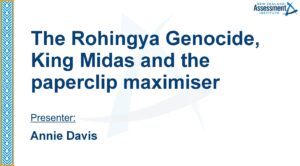There is no video of this workshop available at the moment. We’re hoping to be able to add one at a later date. You can access the workshop Powerpoint at the bottom of this page.
Annie Davis from Selwyn College presented findings from a classroom inquiry into the use of AI as a research tool, with a focus on its role in spreading misinformation during the Rohingya crisis. Conducted within a secondary school setting, the inquiry explored how students engaged with AI-driven research while critically assessing the reliability of sources. The findings highlight that while AI can support differentiated and individualised learning, its effectiveness depends on students being equipped with the skills to fact-check and evaluate information. Without proper guidance, AI can contribute to the spread of harmful narratives. The workshop covered best practices for teaching students how to use AI responsibly, ensuring research remains ethical and accurate.
Annie has been a classroom teacher for 17 years, specialising in Media Studies, Social Studies, and English. Passionate about integrating technology into education, they were part of the first school in New Zealand to introduce BYOD. Annie sees AI tools like ChatGPT and Copilot as one of the most significant and transformative advancements in information sharing since the invention of the internet, radio, TV and the printing press. Excited by AI’s potential to enhance learning and critical thinking, they are committed to equipping students with the skills to use technology responsibly, empowering them as confident, connected, and lifelong learners in a digital world.
Find Annie’s presentation slides here: Annie Davis The Rohingya Genocide, King Midas And The Paperclip Maximiser The Challenges Of AI NZAI 2025


